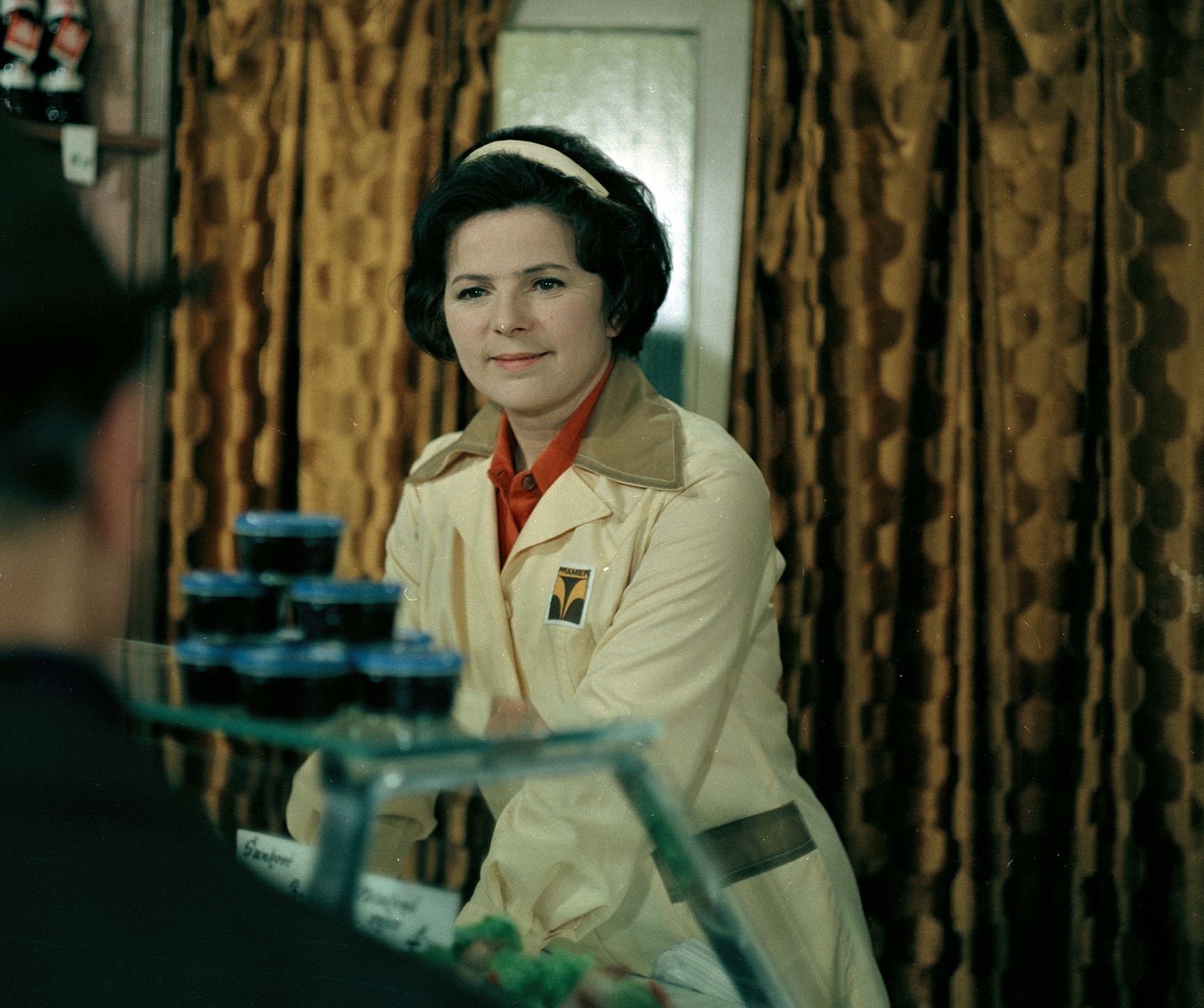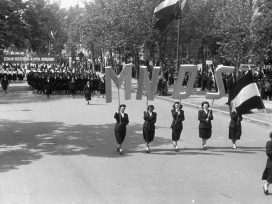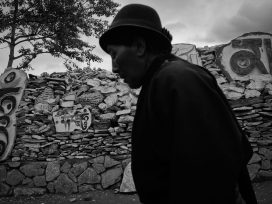Shortly after Donald Trump’s inauguration, Pankaj Mishra encouraged readers of the New Yorker to turn to the work of a Czech anti-communist dissident, Václav Havel, for guidance in our troubled times. ‘Long before the George W. Bush Administration went to war in Iraq on a false pretext,’ Mishra wrote, ‘Havel identified, in the free as well as the unfree world, “a power grounded in an omnipresent ideological fiction which can rationalize anything without ever having to brush against the truth”.’ According to Havel, Mishra continued
‘ideologies, systems, apparat, bureaucracy, artificial languages and political slogans’ had amassed a uniquely maligned power in the modern world, which pressed upon individuals everywhere, depriving ‘humans – rulers as well as the ruled – of their conscience, of their common sense and natural speech, and thereby, of their actual humanity’.
For Mishra, Havel’s work offers a blueprint for the creation of ‘informed, non-bureaucratic, dynamic, and open communities’ that comprise a polis parallel to a politics saturated with ideology.Hungary’s prime minister, Viktor Orbán, also used the occasion of Trump’s victory to disparage the pervasiveness of ‘ideology’. But instead of seeing Trump as a further slide into ideologized politics, Orbán argued that he represents the opposite. ‘The world has always benefited whenever it has managed to release itself from the captivity of currently dominant ideological trends,’ he told reporters. The election
‘gives the rest of the Western world the chance to free itself from the captivity of ideologies, of political correctness, and of modes of thought and expression which are remote from reality: the chance to come back down to earth and see the world as it really is’.
Insidious ideology
‘Ideology’ is a bad word for Mishra, Havel, and Orbán, but this convergence masks sharp differences in their politics. Orbán is criticized by liberals and praised by rightwingers for building a fence along Hungary’s border with Serbia, and for his outspoken and uncompromising stance against Muslim migrants and refugees. During a recent radio interview, he claimed that liberals want migration ‘for theoretical reasons’, and socialists want it ‘for some ideological reason’, too. The Hungarian leader’s fellow travelers – or mentors – deploy the word with the same hissing spite. ‘Ideology’ is all that the liberal billionaire philanthropist George Soros has to offer, declared Igor Psenichkov, whose view was faithfully translated in a Hungarian rightwing magazine as that of a ‘consultant for the influential Moscow Strategic Studies Russian Institute’.
Orbán has argued that his own brand of ‘illiberal democracy’ is what happens ‘when the liberals don’t win’. In his year-end speech for 2016, he noted with relish that all those who thought ‘the liberal world order was unchangeable’, that ‘nations are doomed and can go along with their devotees to the museum’, had been proven wrong. History did not end in 1989, he concluded. Instead, ‘It took a sharp turn, broke through, and broke down the carefully constructed barriers, and stepped out of the bed designated for it.’ His words were meant to sound revolutionary in the spirit of 1989, a bold leap from the all-defining Matrix.
In this conception, the ruling liberal ideology creates automatons that it steers toward self-destruction, an idea that also has an East-Central European pedigree. In an interwar novel by Stanisław Ignacy Witkiewicz (also known as Witkacy) entitled Insatiability (1927), Central Europeans are terrified by the prospect of an Asiatic invasion. But after taking a Murti-Bing pill (named after a fictional Chinese leader) to calm their anxiety, they welcome the invaders with open arms. A little over a decade later, the Polish poet – and later Nobel Prize winner – Czesław Miłosz used the metaphor of the Murti-Bing pill in his book The Captive Mind (1951) to explain why so many Polish intellectuals had come to internalize the Soviet ideology and accommodate the Soviet occupation of Poland.
The trope recurs in Havel’s work too, especially in ‘The Power of the Powerless’ (1978), an essay included in Living in Truth. Havel wrote of the ‘hypnotic charm’ of that eminently flexible ideology known as post-totalitarianism. Much as with the Murti-Bing pill, ‘all one has to do is accept it, and suddenly everything becomes clear once more, life takes on a new meaning, and all mysteries, unanswered questions, anxiety, and loneliness vanish.’ Ideology offers an ‘all-embracing excuse.’ The price of accepting the ideology, however, ‘is the consignment of reason and conscience to a higher authority.’ But ‘ideology’ had lost its influence over people, at least in the eastern bloc, Havel explained. Being conscious of reality, in other words, was enough to live in truth. Havel espoused ‘Politics “from below”. Politics of man, not of the apparatus. Politics growing from the heart, not from a thesis.’
Unpredictable anti-politics
You can see in Orbán’s own rhetoric the debt he owes to this way of thinking. When speaking of the sweeping victory of the liberal world order, he describes it as a force of just such inexorable insidiousness.
‘And we, simple citizens are just left with the option of acknowledging and resigning ourselves to it. And if we don’t want to be embittered for the rest of our lives about our isolated and closed-minded ideas, or rather if we don’t want to be hopeless losers, then we should toe the line, and acquire a taste for the liberal flavours of the open world.’
There’s trouble brewing for Orbán, however. For one, it is difficult to prevent an anti-ideology from becoming an ideology, especially when one is in power. A head of state is by definition no longer a dissident. In the words of György Konrád, who wrote a book titled Anti-Politics in 1982, ‘The most gifted people should be seers, not government officials … power is not a stage but a prison.’ Konrád insisted that ‘anti-politics is the political activity of those who don’t want to be politicians and who refuse to share in power.’ As much as Orbán would like to retain his credibility as a dissident by perpetually declaring his victim status at the hands of a hostile media, international organizations, the European Union, or opposition parties, eventually his assertions ring hollow, especially once they are used to justify ever more shameless power grabs.
Furthermore, the tactic does not belong to any one position on the political spectrum. Among the first to learn this lesson the hard way was the German novelist Thomas Mann, who was also one of the first to use the term ‘anti-politics’. In a long work entitled Reflections of a Nonpolitical Man from 1918, Mann attacked liberal democracy – which he conflated with politics, tout court – from a German nationalist perspective. ‘What infuriates me is the appearance of the intellectual satisfait who has systematized the world under the sign of democratic thought and now lives as a dogmatist, as one who is right,’ Mann wrote. He argued for an anti-politics to counter this force.
‘The one and only possibility in Germany is for national affirmation to imply negation of politics, and democracy – and vice versa. When one sees things in a conservative way, one sees them antipolitically.’
After the publication of Reflections of a Nonpolitical Man, prominent conservatives – many of them proto-Nazis – praised Mann as one of their own. Walter Morris, Mann’s translator, wrote that Mann
‘soon found his association with the conservatives a little more than uncomfortable; many of them actually frightened him, and when he found they were placing national considerations above humane ones, he could no longer count himself one of them.’
And so the great German thinker, who had written of ‘the antithesis of power and intellect’, had to wonder where the anti-politician should stand when it is the conservative who is satisfait, the ‘dogmatist,’ the ‘one who is right,’ the one who aligns his intellect with power.
Havel was more wise to the ambiguous character of anti-politics. He believed that ‘anti-political politics’ was possible, but ‘by its very nature one cannot calculate its effect beforehand’. Instead,
‘It is hidden, indirect, long term and hard to measure; often it exists only in the invisible realm of social consciousness, conscience and subconsciousness, and it can be almost impossible to determine what value it assumed therein and to what extent, if any, it contributes to shaping social development.’
Havel’s own political trajectory speaks to this unpredictability. Although Mishra praised the Czech thinker’s prescience for detecting the insidiousness of ‘ideologies, systems, apparat, bureaucracy, artificial languages and political slogans’, he seems unaware that, in 2003, Havel famously joined George W. Bush’s so-called ‘coalition of the willing’, lending the Czech government’s support to the second Iraq war. ‘Saddam Hussein’s regime poses a major threat to many nations and to his own people,’ Havel said. ‘The right thing for Bush is not to go in alone. There should be an international intervention.’
No comfort for the anti-politician
In his desire to ventriloquize the late Havel as a forefather of the resistance against Trump, Mishra gets a lot wrong. He opens the piece by describing Havel as ‘a writer and thinker who intimately experienced totalitarianism of the Orwellian kind, who believed that it had already happened in America, and who also offered a way to resist it’. Yet Havel wrote not about ‘totalitarianism’ (à la Orwell), but about ‘post-totalitarianism’. This was a much less directly controlling and openly brutal system, one that no longer resorted to camps, show trials and mass executions to enforce its ideology, but instead ‘bought’ people’s loyalty with access to consumer goods. Active dissidents, Havel included, were arrested and imprisoned. Yet it is noteworthy that one of the first countermeasures taken by the Czechoslovak state against dissident signatories of Charter 77 was to initiate a signature campaign against Havel and others led by a television star, Anna Holubová. Viewers knew Holubová from a very popular television series, Woman Behind the Counter (Žena za pultem), which featured her as a counter girl in a well-stocked shop who falls in love with a customer. The distinction between totalitarianism and post-totalitarianism is essential to Havel’s portrayal of East and West as suffering from a common consumerist malaise.

Anna Holubová in Woman Behind the Counter (Žena za pultem).
It is very easy to misread the politics of anti-politics. In fact, it may be that the only predictable feature of anti-politics is its unpredictability. ‘A democratic system operating within the rules of the game is not a historical necessity; it is the work of human beings, freely chosen, deliberately willed, and artificial, and for that reason it is open and subject to further development,’ wrote Konrád. In this respect, Hungary’s leadership is losing its anti-political edge. Orbán’s explicit goal is to make certain that Hungary’s system of government is no longer ‘open and subject to further development’, but rather eminently predictable. Concluding a long speech last July in which he recounted all that his government had achieved since coming to power, Orbán said that, ‘I don’t think we can possibly want anything more than that Hungary should remain a safe point in an uncertain world’. Similarly, he told a sympathetic audience in summer 2015 that ‘in the world anything can happen,’ but that ‘we all want Hungary to be a country where anything can not happen’.
If liberalism was not a historical necessity, the end of history, then neither is Orbán’s illiberalism. The deadly words ‘the system’ now also apply to the Hungarian government.
‘While life ever strives to create new and ‘improbable’ structures […] This system serves people only to the extent necessary to ensure that people will serve it,’ wrote Havel. ‘Anything beyond this, that is to say, anything which leads people to overstep their predetermined roles is regarded by the system as an attack upon itself.’
Little wonder that early demonstrations against Orbán’s government rallied to a song, ‘I Don’t Like the System.’ More recently, Hungarians who have taken to the streets to protest the Orbán government’s policies have brought along red stars on long sticks and posters addressing the prime minister as ‘Comrade’ in Russian. Now who’s ‘living in truth’?







